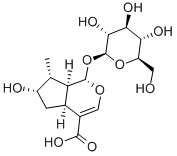Loganic acid is an iridoid glycoside that has been found in C. mas and has diverse biological activities, including antidiabetic, antiadipogenic, anti-atherosclerotic, and anti-inflammatory properties. Loganic acid (1 μM) stimulates glucagon-like peptide-1 (GLP-1) secretion by NCI H716 human enteroendocrine colorectal cancer cells. It inhibits dexamethasone-, 3-isobutyl-1-methylxanthine-, and insulin-induced differentiation of mouse 3T3-L1 fibroblasts into adipocytes when used at a concentration of 10 μg/ml. Loganic acid (20 mg/kg per day) decreases the plasma atherogenic index, a ratio of triglyceride to HDL cholesterol, and the cardiac risk ratio, a ratio of total cholesterol to HDL cholesterol, in a rabbit model of atherosclerosis induced by a cholesterol-rich diet. It also decreases IL-6, TNF-α, and oxidized LDL (oxLDL) plasma levels in the same model.

